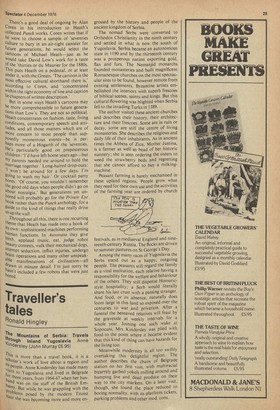Traveller's tales
Ronald Hingley
The Mountains of Serbia: Travels 1,,n.rbugh Inland Yugoslavia Anne Ninders ley (John Murray £6.95)
This is more than a travel book, it is a Its ,eholar's work of love about a region and People. Anne Kindersley has made many fts to Yugoslavia and lived in Belgrade bdr three years, from 1964-67 when her husband was on the staff of the British EmrissY. But while he was grappling with the sOroblems posed by the modern Titoist tate she was becoming more and more en
grossed by the history and people of the ancient kingdom of Serbia.
The nomad Serbs were converted to Orthodox Christianity in the ninth century and settled in what is now the south of Yugoslavia. Serbia became an autonomous state in 1190 and by the thirteenth century was a prosperous nation exporting gold, flax and furs. The Nemanjid monarchs founded monasteries and built magnificent Romanesque churches on the most spectacular sites to be found, however remote from existing settlements. Byzantine artists embellished the interiors with superb frescoes of biblical scenes, saints and kings. But this cultural flowering was blighted when Serbia fell to the invading Turks in 1389.
The author visited these ancient churches and describes their history, their architecture and their frescoes. Some are in ruin or decay, some are still the centre of living monasteries. She describes the religious and daily life of their inhabitants. As in ancient times the Abbess of Zica, Mother Justina, is a farmer as well as head of her historic nunnery; she is seen ordering the sisters to weed the strawberry beds and regretting that she cannot afford to buy a milkingmachine.
Peasant farming is barely mechanised in these upland regions. People grow what they need for their own use and the activities of the farming year are ordered by church festivals, as in mediaeval England and nineteenth-century Russia. The flocks are driven to summer pastures on St George's Day.
Among the many races of Yugoslavia the Serbs stand out as a happy, outgoing people. The peasants still regard the family as a vital institution, each relative having a responsibility for the welfare and behaviour of the others. They still dispense Homericstyle hospitality; a Serb would literally share his last crust with a passing stranger. And food, or its absence, naturally does loom large in this land so exposed over the centuries to war and privation. After a funeral the bereaved relatives will feast by the graveside at weekly intervals for a whole year. Joining one such wake at Sopocani, Mrs Kindersley was plied with food to the point where it became evident that this kind of thing can have hazards for the living too.
Meanwhile modernity is all too swiftly overtaking this delightful region. The author describes the chaos of Belgrade station on her first visit, with multiracial bizarrely garbed yokels milling around and humping live and dead produce on their way to the city markets. On a later visit, though, she found the place reduced to boring normality, with its platform tickets, parking problems and other mod. cons.






































 Previous page
Previous page